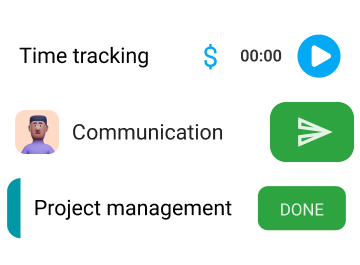Even if you’ve been living under a rock, you must have heard at least some of the noise surrounding people born between 1997 and 2012, aka Gen Z.
They have no work ethic.
Nobody wants to work with Gen Zers.
Gen Z’s lack of social skills is frightening.
But is the static justified? Is Gen Z really the least hireable generation, or are we on the brink of redefining the modern workplace?
To truly understand the noise about Gen Z, we’ve sifted through studies on the Gen Z workforce statistics from various reputable sources, including the newest 2025 research. We also conducted our own CAKE.com Gen Z in the Workforce study in August 2024.
The study included 90 participants from 2 focus groups (managers and Gen Z employees), so each group was given a survey tailored to their role. The managers’ survey focused on their experiences and challenges in managing Gen Z employees, while the Gen Z employees’ survey delved into their work preferences and expectations.
Let’s see what the numbers say.
Key Gen Z Workforce Statistics
Before we dive deeper into the details, here are some of the most interesting bite-sized stats about Gen Z in the workforce:
- By 2030, Gen Z will make up 30% of the total workforce.
- Only 45% of Gen Zs have full-time roles.
- 49% of Gen Z employees like to use instant messaging platforms at work.
- 70% of Gen Z recent graduates expect to be promoted within the first 18 months of employment.
- 74% of Gen Zers would leave a job due to a low salary.
- 71% of Gen Zs want to work in a hybrid workplace.
- 92% of Gen Z graduates would like to discuss mental health at work.
- 40% of leaders claim Gen Z is not prepared for work.
- 42% of managers claim Gen Z employees introduced a more casual workplace environment.
- 75% of managers find it challenging to meet Gen Z’s workplace expectations.
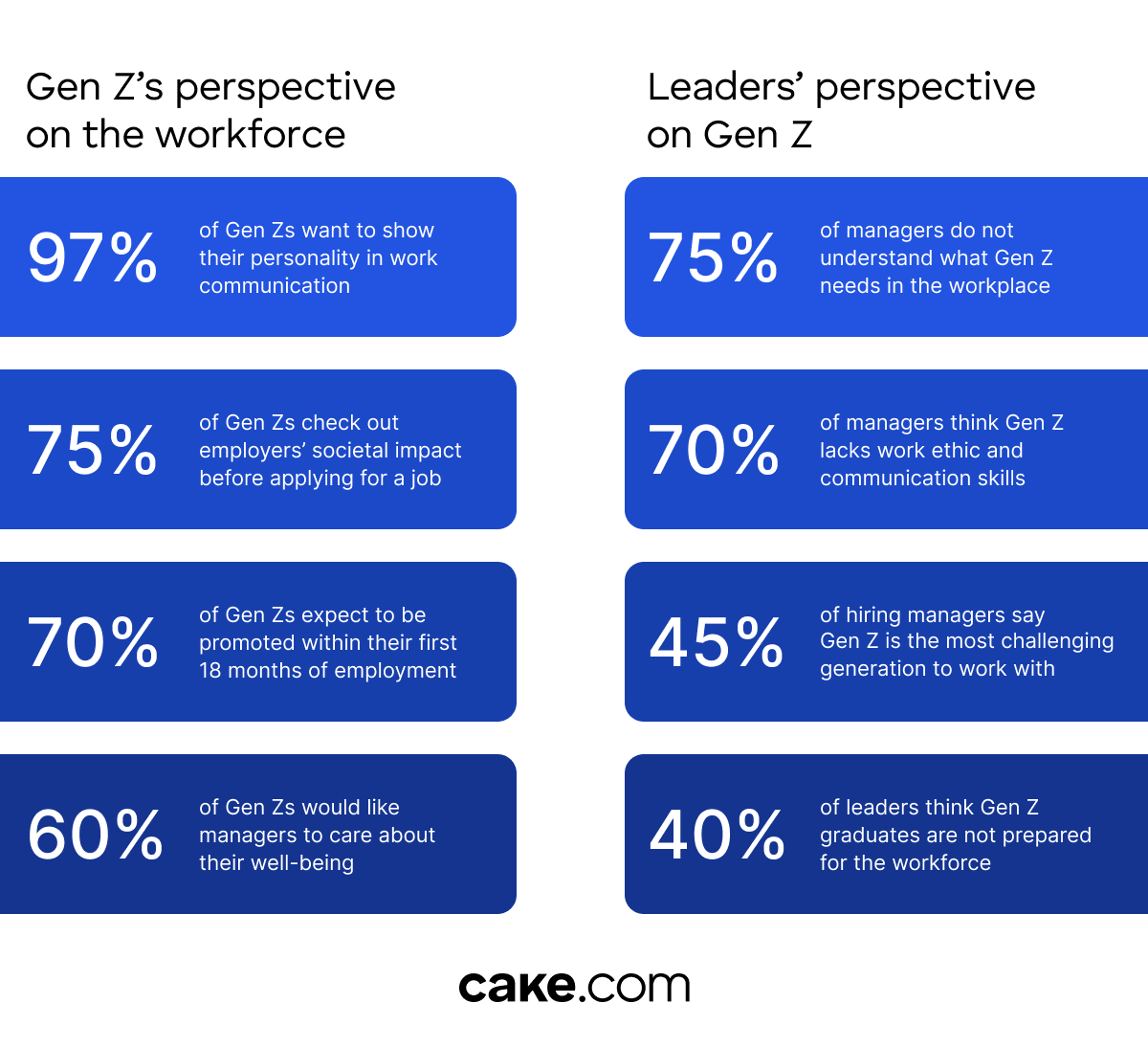
How many Gen Zers are there in the workforce?
The Gen Z workforce is growing — the trends indicating that one in ten managers will be a Gen Zer by the end of 2025 imply as much.
In 2024, there were around 17,5 million Gen Z employees in the US alone.
Worldwide data, however, doesn’t show conclusive information concerning the total number of Gen Z workers.
In fact, the research directed towards Gen Zers mostly focuses on projections.
Some, such as McKinsey’s Quarterly report, indicate that Gen Zers will make up 30% of the total number of employees by the time we reach 2030.
What we do know, however, is that the second quarter of 2024 marked the first time in history that there were officially more Gen Z employees (18%) than there were Baby Boomers (15%) in the workforce, according to the Employment and Training Association Trendlines.
What does Gen Z bring into the workforce?
As an already large share of the labor population, Gen Z undoubtedly has a voice in the modern workplace.
But what exactly do Gen Zers bring to the office desks?
Let’s look at the numbers and get to know this generation beyond the picture painted by the stereotypes.
47% of Gen Zers are career-oriented
We’ve all heard that Gen Zers spend time on their phones like no other generation before.
You’d expect them to be absorbed by the online world at the expense of everything real-world-related, let alone chasing a career.
However, a GWI report on Generation Z has shown that although 25% of Gen Z workforce report spending at least 6 hours per day scrolling, 47% of surveyors claim they’re still career-focused.
Moreover, their wish to progress and climb the proverbial corporate ladder goes so far that over 20% of Gen Zs report feeling overworked, as the GWI research shows.
Further reading:
Overworking can take a toll on the quality of life beyond what you expect. Read more on how to avoid getting overworked here:
49% of Gen Zs already use AI to improve their skills
With 98% of Gen Zers owning a smartphone, GWI’s finding that 49% of Gen Z employees use AI to improve their skills in certain areas on a regular basis seems quite expected. Gen Z career trends definitely involve gaining AI skills.
Ye, our CAKE.com Gen Z workforce report has shown that Gen Zers have opposing thoughts on AI integration in their workplaces:
- 39.7% feel neutral about AI,
- 25.9% feel positive about AI, and
- 20.7% have negative sentiments about AI.
Whether they like it or not, 59% of Gen Zers said that they believe that Gen AI skills are somewhat or highly required for their career advancement, as mentioned in the Deloitte 2025 Gen Z and Millennials Survey.
55% of Gen Zs use AI to solve problems at work
More than half of Gen Z workers (55%) already use AI to solve problems at work, according to Randstad’s Gen Z Workplace Blueprint.
Here’s a preview of what Gen Z employees are using GenAI tools at work for, according to Deloitte’s 2025 Gen Z and Millennial Survey:
- Data analysis — 39%,
- Content creation — 37%,
- Design and creativity — 36%,
- Project management — 32%,
- Strategy — 31%,
- Training — 30%,
- Software development — 30%, and
- Customer support — 28%.
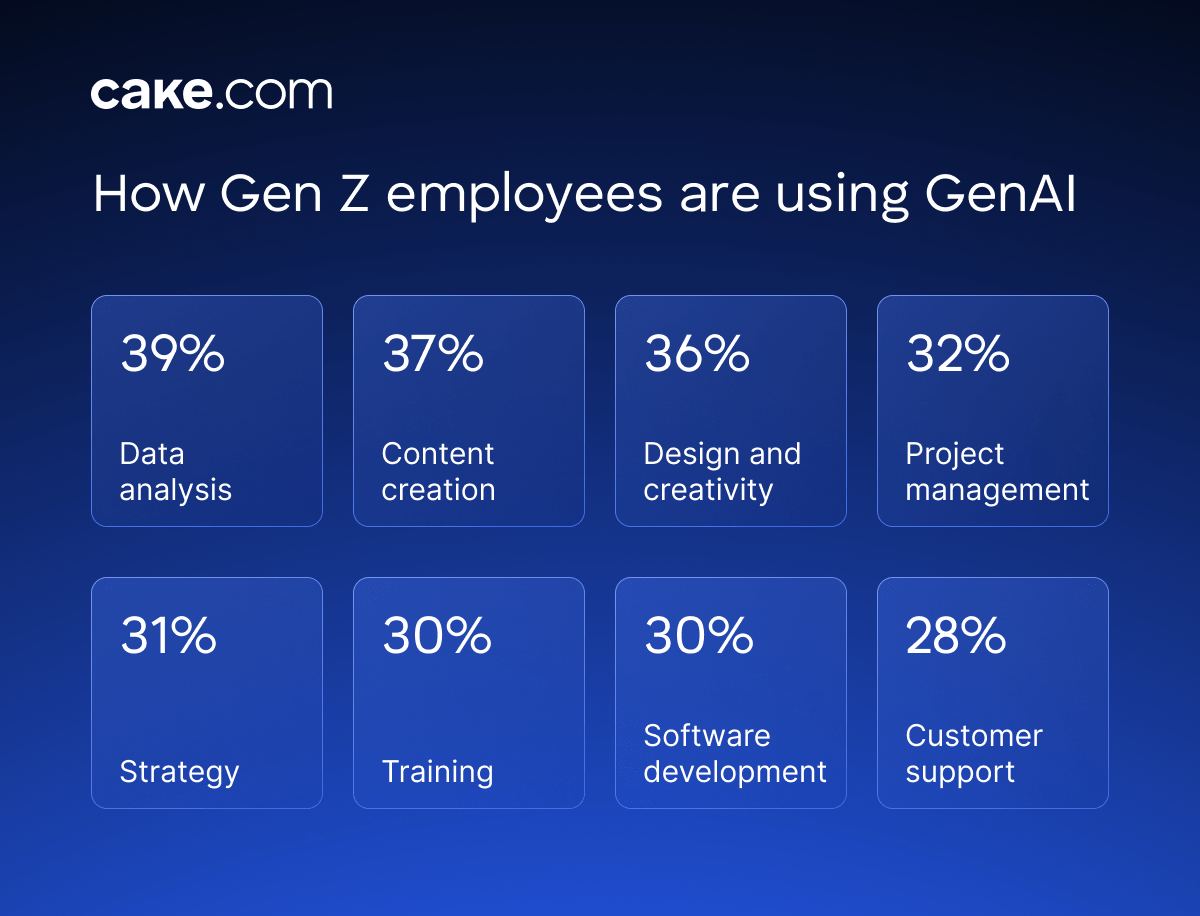
So, generative AI tools are widely used by Gen Zers in multiple spheres of work, from creative tasks to data analysis. It remains to be seen whether these digits will continue to grow in the years to come.
65% of Gen Zers are eager to learn, Gen Z statistics show
Despite the widespread claims that Gen Zers lack work ethic and discipline, this generation prioritizes mastering skills that could help them further progress in their careers.
As the NSHSS Career Interest Survey indicates, 65% of Gen Zers describe themselves as extremely eager to learn.
The motivation to learn continues to be pivotal for Gen Zers even after they enter the workforce. Namely, 25% of Gen Zs participating in the CAKE.com study claim learning and development opportunities are their top motivators at work.
Yet, as fully-fledged digital natives, they’re more inclined to develop their skills online. About 66% of Gen Zs score the Internet higher than college education as their go-to space for cultivating knowledge. Deloitte’s 2025 Gen Z and Millennial Survey notes that one-third of Gen Zs (31%) say they decided not to pursue higher education.
And, according to the 2024 Indeed global study, 45% of Gen Zers are open to taking on side projects or small gigs to expand their professional development. At the same time, 42% claimed that on-the-job training is the best professional development tactic.
49% of Gen Zers prefer instant messaging platforms for work communication
We’ve all heard that Gen Z communicates differently than we’re used to in the work setting. Rumor has it that their language is much more informal, concise, and perhaps even unconventional at times.
Yet, Gen Z workforce statistics show that Gen Z’s workplace communication style is closely tied to their preferred communication platform.
Namely, research from Barclays LifeSkills found that 49% of Gen Zers opt for instant messaging platforms instead of emails at work.
Messaging apps offer the option to infuse your personality into your message — either by using GIFs, emojis, images, or abbreviations. And, as the same research shows, 97% of Gen Zers find showing their personality and being themselves in work communication quite important.
With all that in mind, pulling the plug on the old ‘compose a new email’ button seems like a logical outcome for most Gen Zers.
Further reading:
Gen Z may be onto something for avoiding emails at all costs. See for yourself why instant communication may be the better option:
What does Gen Z want in the workplace?
Undoubtedly, Gen Z brings a breath of fresh air into the workforce.
But what about their expectations? How equal are Gen Z’s demands to what they put forward in the workplace?
Let’s go over the stats and see what exactly Gen Zers expect from their employers.
89% of Gen Z employees want purpose-driven work
Gen Zers have already earned their reputation as the most purpose-driven generation. They’re highly invested in societal issues and are all about making a lasting and meaningful impact on causes they care about.
Unsurprisingly, Gen Zs expect their jobs to mirror their overall lifestyle.
According to Deloitte’s 2025 Gen Z and Millennial research, 89% of Gen Z employees want purpose-driven work.
This percentage has gone slightly up compared to the 2025 Deloitte Gen Z and Millennial survey, where 86% of Gen Zers saw purpose-driven work as pivotal to their overall well-being and satisfaction.
The quest for meaningful and impactful work goes so far that 75% of 2025 Deloitte Gen Z and Millennial Survey participants claim to scrutinize potential employers’ societal impact before applying for a job. At the moment, 67% of Gen Zers who participated in the 2025 Deloitte Gen Z and Millennial Survey feel their job allows them to make a meaningful contribution to society.
Also, according to the same 2025 Deloitte survey on Gen Zers and Millennials, only 6% of Gen Zers say their primary career goal is to reach a leadership position. Gen Z wants to work and develop skills without the pressure that comes with being a leader. For them, it seems it’s all about diversity in experience and work-life balance, and not about managing a team or a company.
70% of Gen Zers want to be promoted within the first 18 months
On top of being known far and wide for their purpose-driven mindset, Gen Zers have become the talk of the corporate world for their all eyes on the prize attitude.
According to the Ripplematch research of over 3,000 Gen Z students and recent graduates — the rumors are true. As many as 70% of Gen Zers expect to be promoted within their first 18 months of employment.
74% of Gen Zers expect high starting salaries and job stability from potential employers
Being fairly compensated for your work shouldn’t be up for debate, and Gen Zers are here to prove it.
As the 2025 Handshake survey on Gen Z expectations has shown, 63% of Gen Zers rank high starting salary and 70% rank job stability as top factors when choosing a job.
But, the very idea of targeting high salaries while being purpose-motivated inevitably raises an eyebrow or two, especially among older adults.
Truth be told, these expectations may seem contradictory at first.
However, as the BBC article on Gen Z’s pay motivations highlights, Gen Zers have grown up witnessing the consequences of poor working conditions and economic downturns first-hand.
Naturally, their parents’ (mostly Gen X) struggles have largely shaped Gen Z’s attitude toward work. Now, they strive towards achieving what they’ve seen missing growing up.
65.5% of Gen Zers want to see their salary increase every 6 months
The already employed Gen Zs have perhaps even higher expectations than Gen Z graduates.
As the CAKE.com study has shown, 65.5% of Gen Zers would like their employer to adjust their salaries every 6 months. 29.3%, on the other hand, want to see their earnings increased at least once per year.
74% of Gen Zers would leave a job because of an unsatisfactory salary
As numbers have shown, many Gen Zers prioritize their earnings to the point where they expect a high salary even before entering the workforce.
In line with these findings, it’s not surprising that low salaries could make Gen Zers give their notice quite quickly.
As the CAKE.com survey has shown, 74% of Gen Zers rank an unsatisfactory salary as their top reason that could make them consider leaving a job.
Unhealthy company culture comes next, with 50% of Gen Zs ranking this factor as a deal-breaker.
78% of Gen Zs want to be recognized and appreciated at work
We all want to feel seen at work, but Gen Z ranks this expectation quite high, according to the Deloitte Generation Z Workforce Experience Study.
As the study highlights, 78% of Gen Zers want to receive recognition and appreciation from their bosses.
However, Gen Zers don’t want to be merely praised for the end result. They want their bosses to recognize their efforts, too.
Yet public acknowledgments do not move them.
The same study points out that Gen Z employees want their bosses to reward their hard work with additional time off or monetary compensation. These expectations only confirm other findings about Gen Z’s quest for financial incentives.
43% of Gen Zers want to have a voice in their company’s decision-making process
Along with being seen comes being involved in decision-making, and Gen Zers expect employers to show they value their opinion.
In fact, as the CAKE.com study shows, 43% of Gen Zers value having a voice in their company’s decision-making process.
The findings are expected because Gen Zers are less hierarchical than previous generations, as the Stanford report on Gen Z mentioned earlier indicates. They are much more likely to expect collaborative leadership and a consensus-based work environment.
60% of Gen Zers would like managers to care about their well-being
Employee well-being has been a hot topic for a while now. But with Gen Z entering the workforce, actual support in achieving that perfect balance between life and work has become a burning issue.
In fact, as the abovementioned Deloitte Generation Z Workforce Experience research shows, 60% of Gen Z employees want their higher-ups to show they care about this generation’s well-being.
Gen Zers value such sentiments from their bosses so much that they claim that genuine care would even lead them to stay longer within a company.
Further reading:
Achieving and maintaining a healthy work-life balance is far from a generational matter. Find out the state of employee work-life trends across different demographics:
92% of Gen Z graduates want to discuss mental health at work
Generation Z has put the mental health topic in the spotlight the moment they stepped into the workforce scene. Now, they expect employers to support their mission of overcoming mental health stigma.
They see the openness about mental health issues so pivotal that 92% of recent Gen Z graduates wish to be able to discuss mental wellness at work, the Monster’s newest State of the Graduate Report shows.
Yet, once Gen Z starts working, reality immediately contradicts their expectations. At least, that’s what the already-employed Gen Z workforce reports.
As the already mentioned multigenerational workplace Deloitte survey on Gen Z and Millennials shows, only 56% of Gen Zers feel comfortable talking with their higher-ups about mental health challenges.
On top of that, 52% believe their managers would be able to support them with mental health concerns, whereas 26% of Gen Zers worry they’d be discriminated against if they tried openly discussing mental health issues at work.
Further reading:
The state of our mental health can also depend on the level of overstimulation we experience at work. Learn how to reverse its effect:
44% of Gen Zers would reject a job based on their ethics or beliefs
Gen Zers hold their values quite dear — to the point where they’d reject a job offer if it didn’t align with their ethical principles.
As the previously mentioned 2024 Deloitte survey on Gen Z and Millennials reveals, 44% of Gen Zers are willing to turn down employers if they notice something that doesn’t align with their beliefs.
Some of the factors that Gen Zers list as key to turning down an employer are:
- Having a negative impact on the environment,
- Contributing to inequality, and
- Not offering support for employees’ mental well-being or work-life balance.
The CAKE.com study confirms these findings since 41.4% of surveyed Gen Zers find their employer’s social and environmental involvement quite important.
81% of Gen Zers value transparency and honesty at work
Knowing what we do about Gen Z’s authenticity, it should come as no surprise that 81% of Gen Zers participating in the CAKE.com study prioritize transparency and honesty in their workplace, too.
On top of transparency, Gen Zers expect their workplace to mirror other values they hold dear, such as:
- Ethical business practices: 81%,
- Innovation and creativity: 62.1%, and
- Diversity and inclusion: 43.1%.
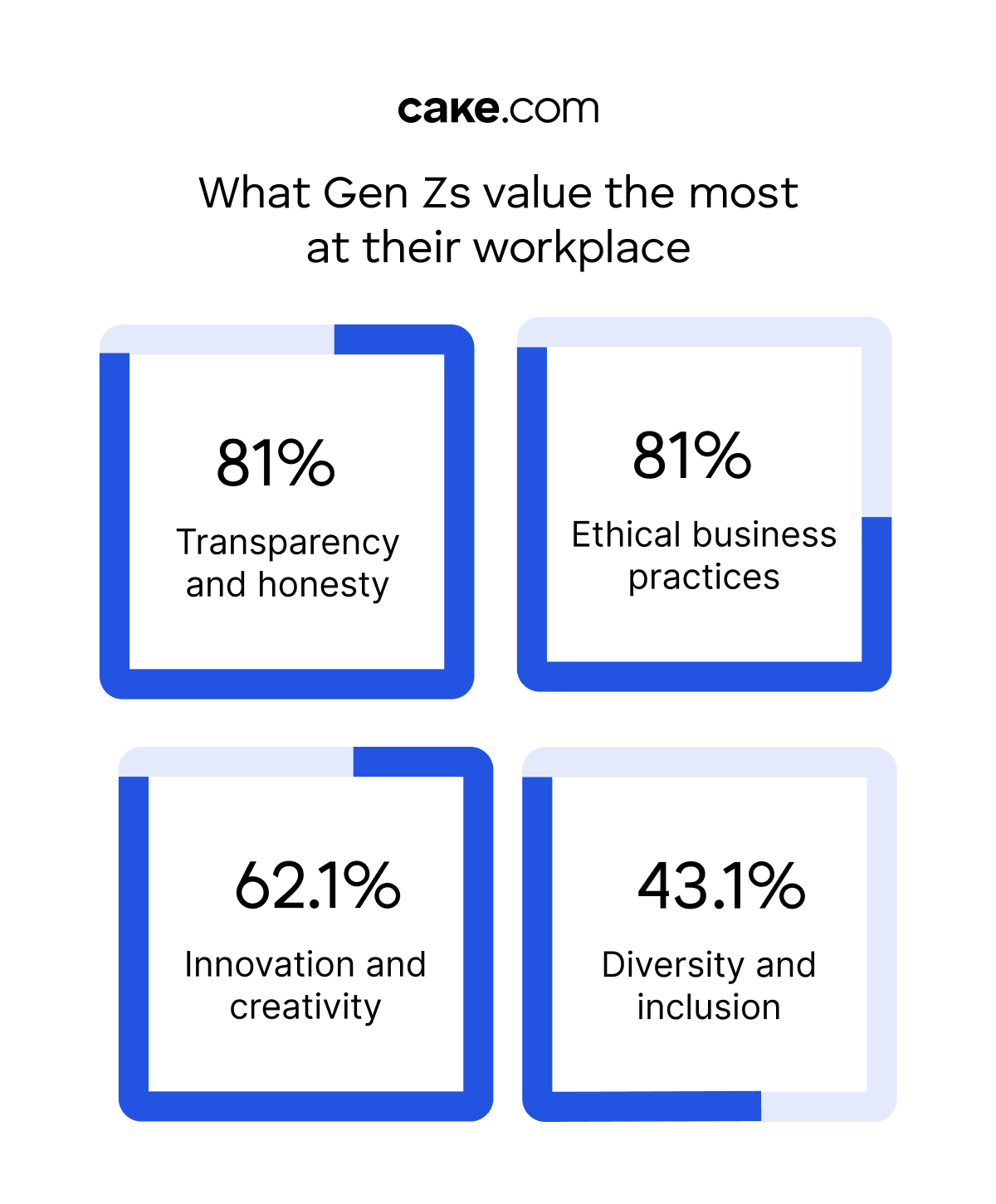
71% of Gen Zers want to work in a hybrid workplace
Contrary to popular belief, Gen Zers don’t want to work remotely forever.
The 2025 Gallup’s findings shows that only 23% of Gen Zs want to work in an exclusively remote role.
Other research, such as LinkedIn’s State of the Labor Market report, sees this preference for in-person work settings as a logical consequence of Gen Z’s lack of office life experience.
But, Gen Zs’ desire to work in an office is not high either, as only 6% of them claim they’d prefer an on-site job. The hybrid workplace emerges as an ideal solution, with 71% of Gen Zers who would prefer this type of work model.
When it comes to productivity in office and remote workplaces, the same Gallup’s research shows Gen Zers claim to be almost equally productive in both. To be more precise, 37% of Gen Z workers point out they’re most productive when working remotely, compared to 32% who claim to be the most productive when working in an office environment.
While other generations have decades of in-office work experience, many Gen Zers entered the job market during the pandemic. That’s why they’re more likely to feel like they’d be missing out on the social aspect of the workplace if they accepted a remote job offer.
69% of Gen Z students want to find a job near their family
The cost of living and financial security are key factors for students when deciding if they want to apply for a certain role.
The Handshake State of the Graduate Class of 2025 report found that 69% of Gen Z students make it a medium or high priority to find a job that is close to their family. In this way, they could continue living with their parents or other family members.
In fact, the right location can significantly increase the chances of application for the job, as 73% of Gen Zers are more likely to apply in this situation.
And, once they do decide to relocate for a job, and according to the same Handshake research, these are the key factors Gen Zers deem “very important”:
- Cost of living — 65%,
- Community safety — 61%, and
- Ease of commuting — 53% of Gen Zers.
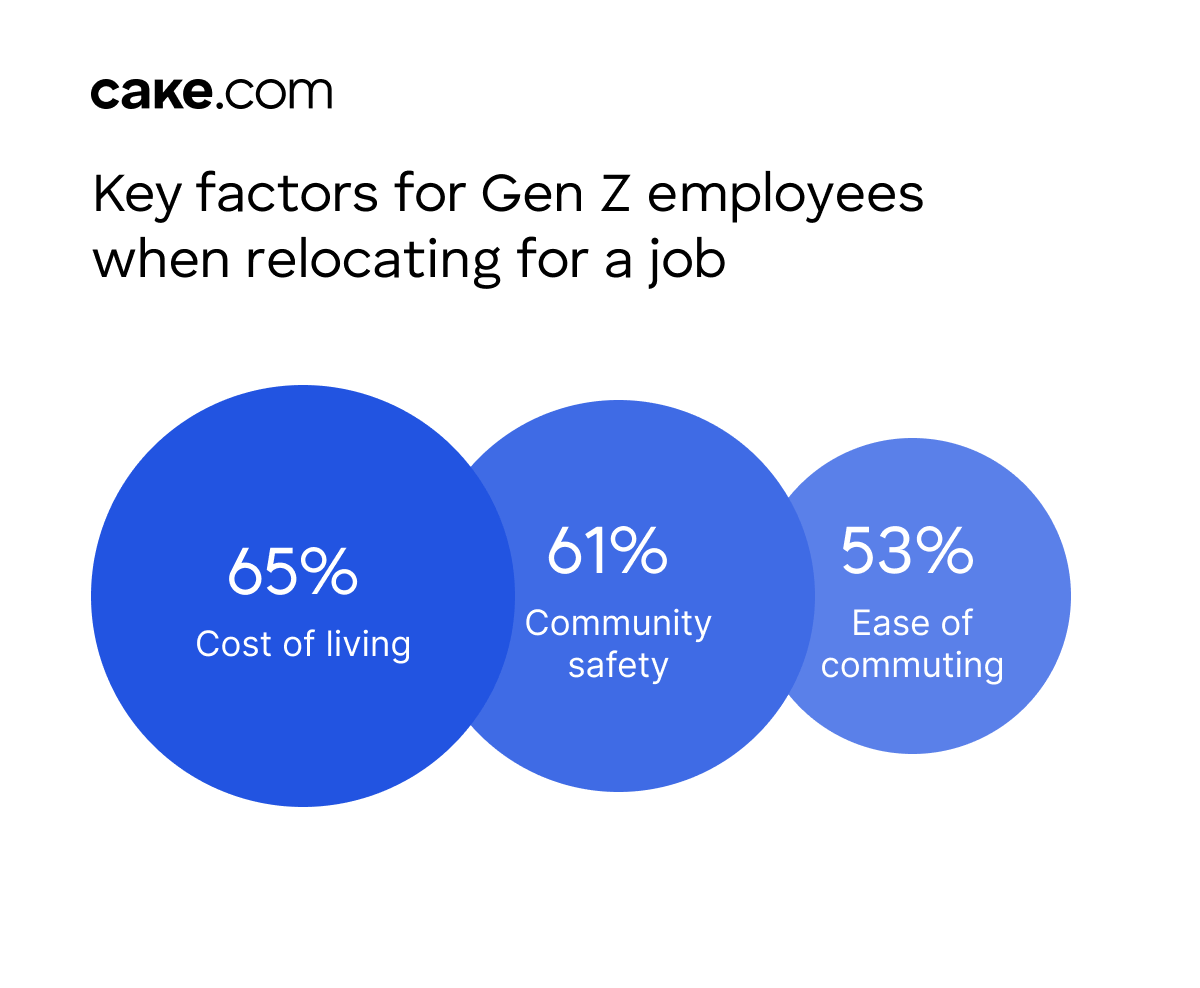
How do higher-ups see Gen Z?
Every generation entering the workforce comes with a specific set of attitudes and expectations under their belt — and Gen Z is no different.
But what does it look like from their higher-ups’ point of view?
Let’s see what people who have worked with Gen Z say about this generation’s expectations, work ethic, values, and strengths.
40% of leaders believe Gen Z graduates are not prepared for the workforce trends
Gen Zers have already made headlines for their workplace expectations, challenging traditional corporate narratives.
Since their leaders have been operating within the same work structure since they first entered the workforce, it’s easy to see where the generational clash might occur.
Unsurprisingly, a survey from Intelligent, which included 1,243 business leaders, shows that 40% of leaders see Gen Z graduates as unprepared for the workforce.
Of all the business leaders who’ve described Gen Z graduates as unprepared, 70% see it as a consequence of the generation’s lack of work ethic and communication skills.
62% of respondents see culture as the main culprit for recent graduates not being ready for the workforce.
As a way to solve this issue, 88% of leaders recommend the introduction of office etiquette classes at universities.
Further reading:
It seems that now and more than ever before, it’s important for leaders to practice the empathetic leadership style. Read all about it here:
45% of hiring managers say Gen Z is the most challenging generation to work with
Considering that a great number of leaders see Gen Zers as lacking skills necessary for the workplace, hiring managers’ stance on the difficulty of working with Gen Z doesn’t come as a surprise.
Namely, 45% of hiring managers surveyed by Resume Genius claim that working with Gen Z is challenging to such an extent that they plan on hiring more Millennials.
The survey doesn’t go into the reasons behind such sentiments. However, perhaps something could be ascribed to the “they know what got us here won’t get us where we need to go” viewpoint that Marcie Merriman, the managing director of EY, attributes to Gen Z in the most recent EY Gen Z Segmentation Study.
Being born into an uncertain environment and seeing how such conditions shaped the workplace trends and society we’re living and working in today, Gen Zers are much more likely to question the existing establishments and expect change.
With their higher-ups having been trained to manage generations with sharply different expectations — it’s only natural that they’d find working with Gen Z challenging.
Further reading:
Age bias is a well known implicit bias that can manifest in the workplace, often through attributing negative traits like laziness and immaturity to young people. To learn more about workplace biases and how to overcome them, read this guide:
75% of managers claim recognizing Gen Z’s needs in the workplace is difficult
On top of having difficulties finding common ground while collaborating with Gen Z, managers report having a hard time understanding Gen Z’s expectations.
As the previously mentioned Deloitte Generation Z Workforce Experience Study shows, 75% of managers are not able to pinpoint exactly what Gen Z needs in the workplace.
The same study reports that a gap between leaders and their Gen Z employees goes beyond knowledge. Some leaders understand Gen Z’s needs but don’t agree with them, while others see that certain changes are necessary but aren’t sure how to implement them.
72.4% of higher-ups see regular feedback as an effective motivator for Gen Z employees
Although Gen Zers have already been labeled as unprepared for the workforce, managers can still find a workaround to help them adjust to the work environment as smoothly as possible.
For 72.4% of managers participating in the CAKE.com study, that solution is regular feedback.
According to 45% of surveyed managers, providing mentorship or coaching is another effective way to motivate Gen Z employees.
Additional motivators managers have pointed out include:
- Recognizing achievements publicly: 41.4%, and
- Offering career development opportunities: 35%.
Further reading:
If you’re about to manage a team of Gen Zers, shying away from giving feedback could only hinder your team’s motivation. See how to incorporate giving constructive feedback into your leadership style:
45% of managers have difficulty matching Gen Z’s salary expectations
Up until this point, with Gen Z entering the workforce, we’ve all become aware that they expect to be adequately compensated for their work.
Yet, if we pair this expectation with the higher-ups’ dilemma on how to meet Gen Z’s needs, it’s easy to see why managers may find it challenging to meet this generation’s anticipated pay range.
In fact, 45% of managers participating in the CAKE.com Gen Z study claim that matching Gen Z’s salary expectations is one of their biggest challenges.
Career advancement expectations come out as a runner-up — with 41% of higher-ups facing challenges meeting Gen Z’s career development ambitions.
42% of managers claim Gen Zers fostered a more casual atmosphere in their workplace
Gen Z’s more casual approach to work style, communication, and many other conventional workplace norms has made an impact on the world of work, at least to some extent.
As the CAKE.com study shows, 42% of managers have noticed Gen Z’s presence creating a more casual and flexible work atmosphere.
21% claim Gen Zers contributed to a more collaborative environment, whereas 20% of managers see an increased focus on technology and innovation after Gen Zers joined their teams.
Yet, 31% of higher-ups see Gen Zers having little to no impact on their workplace culture, showing that there’s still a long way to go until we see significant workforce changes resulting from Gen Z’s presence.
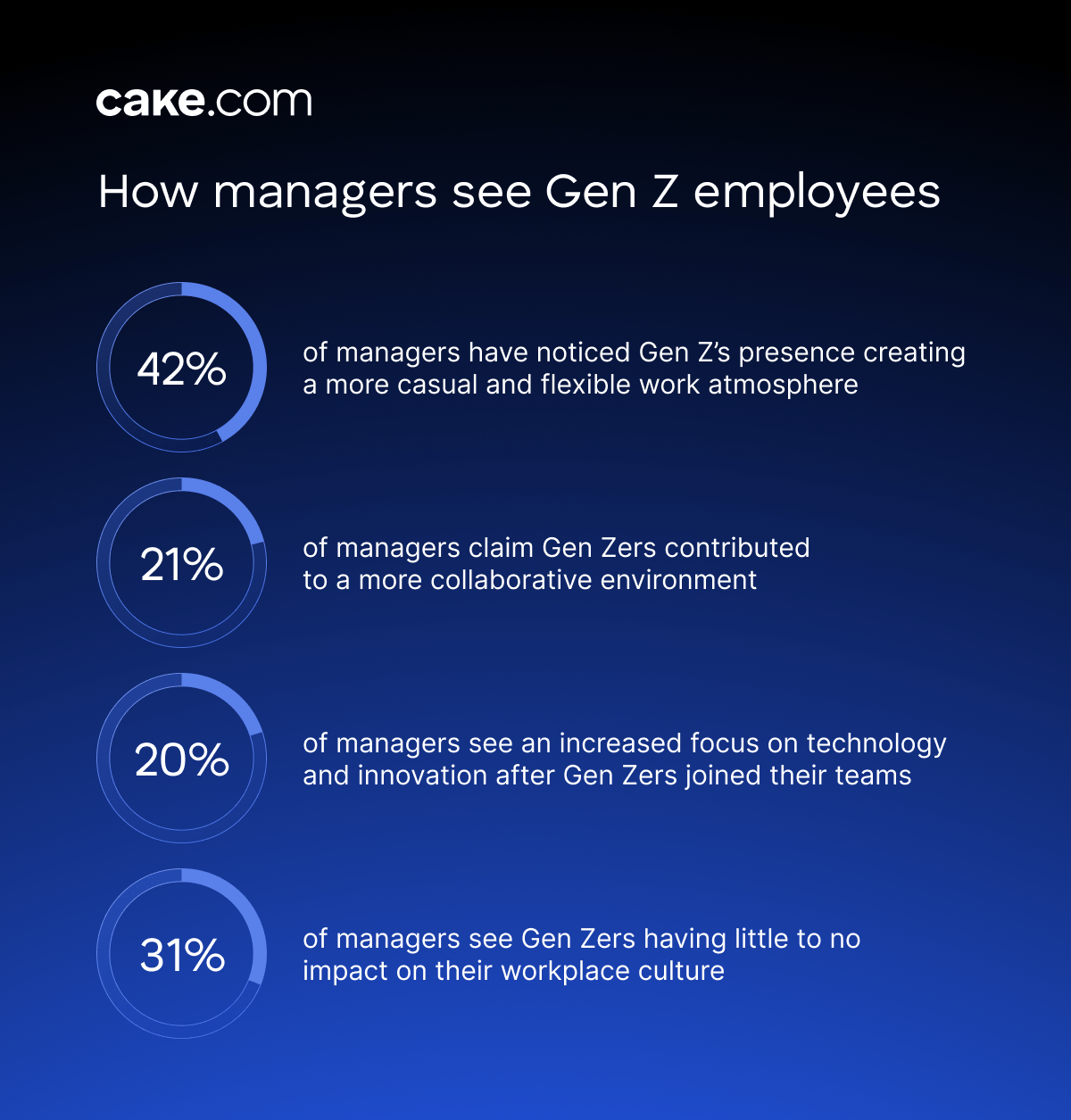
How can employers attract and retain Gen Z talent?
According to Manpower Group’s World of Work for Generation Z 2025 report, employers are doing everything in their power to attract and retain the next workforce generation. This includes:
- Improving technology tools (76%),
- Being mindful of workforce well-being (75%),
- Offering work hours flexibility (73%),
- Increasing compensation (73%), and
- Offering career development opportunities (73%).
This is in accordance with what Gen Z entering the workforce wants from the workplace.
For instance, 86% of Gen Zers seek mentorship and guidance, and 88% of Gen Zers value on-the-job learning and practical experience for skill development, as per the Deloitte’s 2025 Gen Z and Millennial Survey.
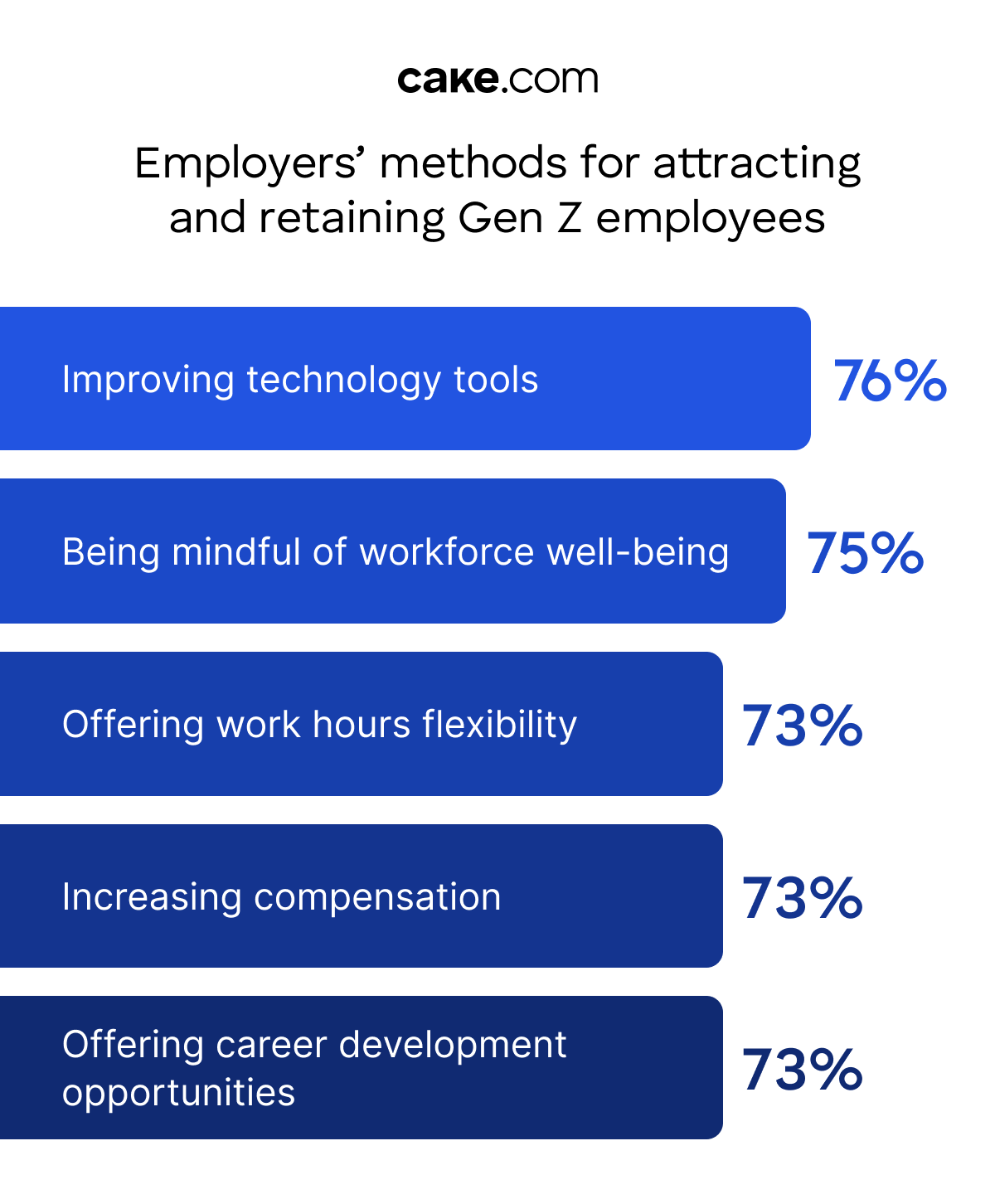
Only 45% of Gen Zers have full-time roles
Full-time roles don’t seem to interest Gen Zs as much, since only 45% of them currently hold such traditional roles, according to the recent Randstad’s Gen Z Workplace Blueprint report.
What’s more, 31% of Gen Zers would like to combine a full-time role with a ‘side hustle’. However, the reason behind this is not that they don’t enjoy their full-time role, but that they want to gain new experiences, increase their income, and have more control over their career.
In fact, the same research shows that the average time spent on the job within the first five years of employment is just 1.1 years. Again, the reasoning behind this is that Gen Z employees want to grow their experiences and careers — and they can’t do this by staying in the same role for years.
69% of Gen Zers say technology makes them feel less connected at work
Although Gen Z is a digital-born generation, they’re aware of the downsides this may have brought.
As per the Freeman 2025 Gen Z Report, a staggering 69% of Gen Zers say technology “has made them feel less connected and more isolated from others at their company/in their industry.”
That’s why it comes as no surprise that 79% of Gen Z feel like companies focus more on technology to connect to people than on building in-person connections.
Perhaps this can explain why only around 2 in 5 Gen Zers express high confidence in networking with people in their industry or building strong business relationships.
So, combining technology use and in-person events, when possible and practical, can be part of the solution to both feeling less isolated at work and feeling more confident in developing business connections.
The Gen Z impact on the workforce remains unfolding
As Gen Z statistics show, we’re yet to witness the influx of this generation into the workforce.
However, based on the findings we have up to this moment, the already employed Gen Zers have established the generation’s reputation as a cohort driven by strong purpose and high workplace expectations.
As is the case with all ‘the kids these days,’ situations, Gen Z’s wishes are not exactly met with approval. At least not in the traditional, multigenerational workplace environments we’re all still a part of.
Managers find it challenging to collaborate with Gen Z, and they still don’t have a solution that meets Gen Z’s expectations.
Perhaps the challenges both Gen Zers and their higher-ups face testify to the fact that nobody’s yet prepared for the workplace swarmed with digital natives.
What’s for sure is that something in the world of work is about to change.
Yet, whether we’re about to see tectonic shifts that’ll fit Gen Z’s approach to work or witness Gen Zers conforming to the established workplace narratives — it remains to be seen.
What we know with certainty is that using the right tools enhances employees’ productivity, encourages team collaboration, and eventually leads to timely project success.
That’s why we have developed the following 3 productivity tools:
- Clockify — a time tracking tool,
- Plaky — a project management tool, and
- Pumble — a team communication tool.
You can get them at a 53% discount by choosing the CAKE.com Productivity Bundle. The ease of use, practicality, affordability, and most importantly, great results in efficiency, make this deal perfect for Gen Z, and any other working generation, for that matter.
How we reviewed this post: Our writers & editors monitor the posts and update them when new information becomes available, to keep them fresh and relevant.